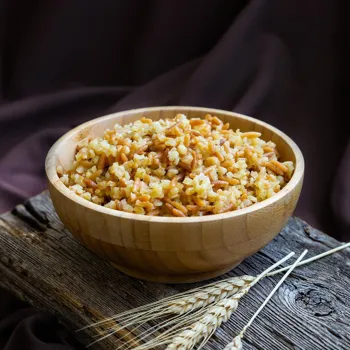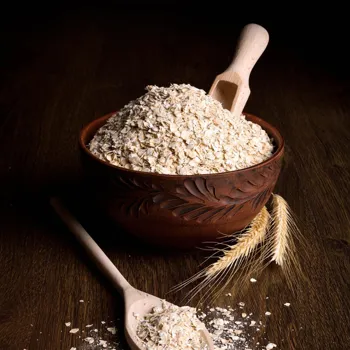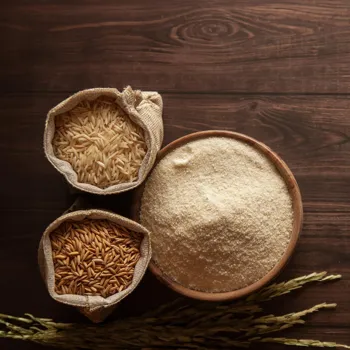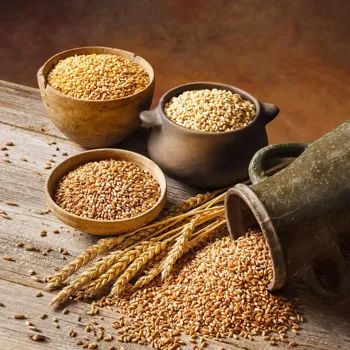Unlock the Power of Whole Grains: Discover 10 Reasons to Transform Your Diet for a Healthier, Happier You!
In the hustle and bustle of our daily lives, often we tend to grab the quickest and easiest food
options, often neglecting the importance of a balanced and nutritious diet. One crucial aspect of a healthy diet is the inclusion of whole grains.

These nutritional powerhouses offer a wide array of benefits, far surpassing their refined counterparts. So, let's dive into ten compelling reasons why you should incorporate more whole grains into your daily meals, making your life healthier and happier.
Whole grains reduce LDL cholesterol, benefiting heart health
Whole grains are packed with fiber, which plays a vital role in reducing bad cholesterol levels (LDL) in the blood. High LDL cholesterol can lead to the buildup of plaque in your arteries, increasing the risk of heart disease and stroke.

The soluble fiber in whole grains acts like a sponge, soaking up cholesterol and escorting it out of the body. This, in turn, helps maintain healthy blood pressure levels. Include oats in your breakfast, or opt for whole-wheat bread instead of white bread.
Moreover, certain whole grains contain compounds like lignans and plant sterols, which have been shown to further protect against heart disease. Remember, a healthy heart is the cornerstone of a healthy life.
By choosing whole grains, you're investing in the long-term well-being of your cardiovascular system. Think of it as a small daily step that can have a significant impact on your overall health over time.
Whole grains aid weight management through sustained energy and stable blood sugar
Whole grains are incredibly filling due to their high fiber content. This makes you feel fuller for longer, preventing overeating and helping you manage your weight more effectively.

Refined grains, on the other hand, are quickly digested, leading to blood sugar spikes and crashes, which can trigger cravings and contribute to weight gain. Also, fiber is a type of complex carb that takes longer to digest.
This slower digestion keeps blood sugar levels stable, preventing those energy dips that lead to unhealthy snack choices. Instead of reaching for processed snacks, a handful of whole-grain crackers or a small serving of brown rice can provide sustained energy and keep your weight in check.
So, incorporating whole grains into your diet isn't just about adding a healthy food group; it's about adopting a sustainable approach to weight management and overall well-being.
Whole grains aid digestion, support gut health, and improve overall well-being
The fiber in whole grains is a fantastic aid for your digestive system. It promotes healthy bowel movements, preventing constipation and other digestive issues. Fiber adds bulk to your stool, making it easier to pass through the digestive tract.

This regular movement helps to cleanse your colon and reduces the risk of developing conditions like diverticulitis. In addition, whole grains contain prebiotics, which are non-digestible fibers that feed the beneficial bacteria in your gut.
These bacteria play a crucial role in maintaining a healthy gut microbiome, which is essential for overall health. A healthy gut biome is linked to improved immunity, better nutrient absorption, and even mental well-being.
Replacing refined grains with whole grains is a simple way to nourish your gut and promote optimal digestive health. So make sure you are choosing whole grain to improve your digestion.
Whole grains stabilize blood sugar, vital for diabetes prevention
Unlike refined grains that cause a rapid spike in blood sugar, whole grains are digested slowly, leading to a gradual and sustained release of glucose into the bloodstream. This is particularly important for people with diabetes or those at risk of developing the condition.
The slow release of sugar prevents sudden spikes and crashes, helping to keep blood sugar levels stable throughout the day. Whole grains also improve insulin sensitivity, meaning that your body becomes more efficient at using insulin to regulate blood sugar.
This reduces the burden on your pancreas and decreases your risk of developing type 2 diabetes. Opting for whole-grain alternatives like brown rice, quinoa, or whole-wheat pasta can be a powerful tool in managing blood sugar levels and preventing the development of diabetes.
This simple dietary adjustment can have a profound impact on your long-term health.
Incorporating whole grains lowers cancer risk through antioxidants and fiber
Studies have suggested that incorporating whole grains into your diet may lower your risk of certain cancers, particularly colon cancer. The fiber in whole grains helps to move waste through the digestive system more quickly, reducing the exposure of the colon lining to harmful substances.

Whole grains also contain antioxidants, which protect cells from damage caused by free radicals, further reducing cancer risk. Some studies have even shown a link between whole grain consumption and a reduced risk of other cancers, such as breast cancer and stomach cancer.
While more research is needed, the existing evidence suggests that whole grains play a significant role in cancer prevention. By making whole grains a regular part of your diet, you're taking a proactive step towards protecting your health and reducing your risk of developing these serious diseases
Whole grains offer vital nutrients for health; choose them over refined grains
Whole grains are packed with essential nutrients that are vital for overall health. They are a good source of vitamins, minerals, and antioxidants, including B vitamins (such as folate, niacin, and thiamin), iron, magnesium, and selenium.
These nutrients play a crucial role in energy production, nerve function, and immune system support.
B vitamins help convert food into energy, iron is essential for carrying oxygen in the blood, magnesium supports muscle and nerve function, and selenium acts as an antioxidant, protecting cells from damage. Refined grains, on the other hand, lose many of these nutrients during the milling process.
Choosing whole grains over refined grains is a simple way to ensure that you're getting the essential nutrients your body needs to thrive. So, try and include whole grains like brown rice, oats or roti to get essential nutrients.














